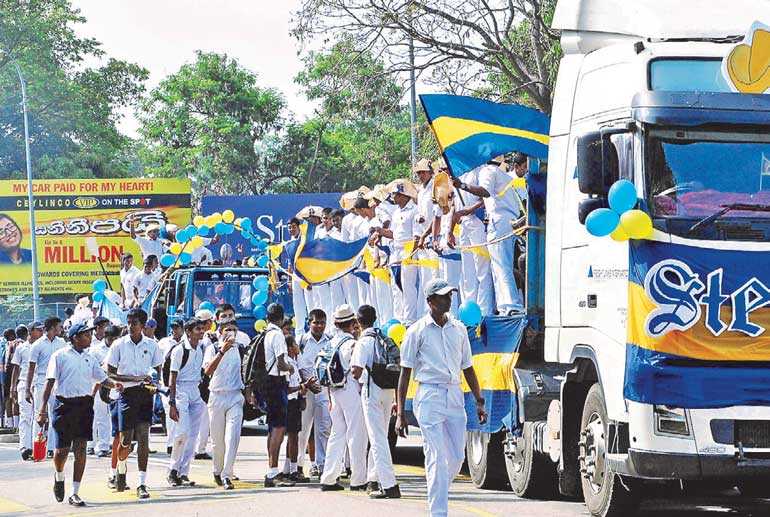Saturday Feb 14, 2026
Saturday Feb 14, 2026
Tuesday, 24 April 2018 09:38 - - {{hitsCtrl.values.hits}}

The big-matches could be seen as an intriguing social phenomena which highlight the specific cultures and models of ‘maleness’ taught within these boys’ schools
This year, in the middle of ‘big-match fever’, a Facebook thread of a young woman caught our Eye. She had taken some photographs of school-boys ‘trucking’ during their big-match weekend, and posted them on her Facebook wall. In the photos, the group of school-boys are holding up lewd hand-painted signs which said ‘SEX TONIGHT’ and ‘SHOW ME YOUR BOOBS’. 
The Facebook post naturally expressed the young woman’s shock and serious concern at the signs held up by the young men and the rather blatant way in which they were doing it. What we found interesting – and distressing – was the onslaught of comments which then appeared underneath this post in defence of the young men’s actions.
Some of the comments attempted to attack the original poster by calling her everything from an ‘aunty’ to a ‘feminist snowflake’. In particular, a vicious hatred towards ‘feminists’ and ‘feminism’ was bluntly on display (“Feminism gone haywire,” one commenter said).
The sexist and outright misogynistic verbal abuse expressed towards the young woman there, and the confidence with which it was meted out, was a signifier of the impunity extended to schoolboys when they discover their “manhood”, and an example of how the boys’ club/s spring to defend their own, often through attempts to humiliate and belittle any critical voice – especially if it is a woman.
Toxic masculinity
The ‘big-match’ season has just come to an end. These historical sporting encounters that began in the late eighteen hundreds in some of the private schools set up by the Christian clergy, have today been adopted by most private and Government boys’ schools around the country. What may have started off as an annual event to foster sportsmanship and ‘healthy rivalry’ has over the years evolved into a significant annual event that even draws nostalgic ‘old boys’ (alumni) from around the world.
The events command much media attention, and are able to draw generous sponsorships from media institutions and from large corporations. (Big-matches garner so much attention that at various times politicians and even incumbent prime ministers have been known to make an appearance as a show of support but also for its PR potential!)
The big-matches could be seen as an intriguing social phenomena which highlight the specific cultures and models of ‘maleness’ taught within these boys’ schools. Yet, we contend that big-matches are but a heightened example of a toxic kind of masculinity, which is being produced and fostered within these schools more generally.
What do we mean by ‘toxic masculinity’? We understand toxic masculinity to refer to certain characteristics such as violence, a lack of a show of emotions, sexual dominance, aggression, over-protectiveness, ‘hardness’ as opposed to ‘softness’ etc., which are normalised or valued as ideal for men. E.g.: the age-old adage of ‘boys don’t cry’. Toxic masculinity also assumes that a real man must be heterosexual and nothing else.
Toxic masculinity has devastating effects on the women, men and children on whom it is imposed. It has also devastating effects on the men of whom it is expected.
In this column, we want to explore how the big boys’ schools in Sri Lanka are in the business of producing, sustaining and defending toxic masculinity in Sri Lanka.
Impunity
Frederica Jansz’s series of explosive articles in 2011 published in The Sunday Leader blew the lid off on prefect-to-student abuse and violence taking place unchecked at a leading private boys’ education institution in Colombo. When the school came under attack, drawing criticism from a wider public readership, many alumni sprang to its defence, aggressively – adult men, respected professionals in their own fields.
But the exposé only served to throw light on something that many men and women growing up in Sri Lanka already know in different ways: casual violence and abuse, sexual and otherwise, is a strange and potent part of the boys’ school experience here.
In the schools, the men, be they perpetrator or victim, or a complicated mix of both (as is often the case), never see that subjecting others to abuse or violence has serious consequences. Powerful perpetrators of abuse like prefects never face consequences, protected by their badge. Conversely, nor do they ever see examples of other powerful perpetrators, like teachers or principals, having to face any consequences.
The first lesson about impunity many young men receive is therefore in their schools, where impunity is practically ‘handed’ to them as a key component of what they are entitled to as Sri Lankan men.
Response to violence
Lone voices have over the years attempted to critique these cultures of entitlement and impunity, which are sanctioned, promoted and protected by leading boys’ schools, only to be met with the vilest and harshest of backlash from alumni. The response to the articles by Frederica Jansz proved this; that Facebook thread proved this all over again.
These defences raise interesting questions about our response to violence as a society, particularly when layered by our understandings of liberal/illiberal values and on top of that, the dynamics of class and elitism.
For example, on occasion, it has been the very same people who defend boys school ragging and abuse on the grounds of ‘tradition’ and ‘just a bit of fun, who come out most vocally against ragging and violence in the public university system in Sri Lanka. Often, it has been the same liberal elite folk who can clearly articulate their objections to ‘nepotism’ and ‘patronage’ and ‘corruption’ when talking about politicians, who reap the benefits of the contacts and connections of the ‘old boys’ networks.
Old boys networks
That brings us to the ‘old boys’ networks. The relationships, cultures and behaviours established in schools, morph into ‘old boys networks’. These networks privilege its members when it comes to finding jobs, getting things done, and in having access to total impunity with the law, through contacts and friends made in school.
Within these networks, the economically privileged, and the politically well-positioned band together. Sometimes they are one and the same – sometimes they are not. These cliques concentrate economic, social and political power in the hands of a few chosen men who belong to the socially and economically elite classes, who belong (often) to the ‘right’ ethnic/religious group, and who perform the norms of heterosexual maleness, for generations.
The Mustangs tent at the Royal-Thomian big-match is not just a great location from which to watch the cricket – it is a sacred bastion of networking and deal-making for the chosen.
The effects of this are apparent in the white collar crimes, crony-capitalism and high-level corruption that pervade our corporate and political sectors today, with total impunity.
Consider the piece written by senior fashion design professional and executive, Mihiri de Silva, about her first-hand experience of sexual harassment and subsequent attempts at a cover-up, at her former workplace – a leading apparel manufacturing company (her piece is titled ‘Change is not Courage in a Boys’ Club’ and is published on www.groundviews.org).
She says, of feeling forced to leave her post, “I lost my income and my career. My livelihood changed by no wrong doing of my own but due to an age-old ‘boys club’ situation in what is portrayed as a very modern company.” No action was taken. No one, but the victim in this situation, paid any price.
When looking at these ‘old boys clubs’, however, it is important and interesting to observe that many men are also excluded from them – men who did not have the ‘privilege’ of attending these schools, for one thing. But also some of the men who did attend the schools but somehow did not meet the accepted norms. Certainly, queer (non-heterosexual) men, who do not perform the required gender-role. But other kinds of men too – men who belong to the socio-economic classes which fall under the bar, men who belong to ethnic or religious minorities sometimes, and simply, often, the men who actively refused to partake in the ritual violence.
The effects of these cultures must certainly be a skewed understanding of violence and importantly, and a crisis of masculinity. With school-boys being encouraged to internalise violence and trauma as a major component of their masculinity, how does this affect their understanding of human relationships, love, sex, sexuality and power?
Time for change
It is important to ask ourselves what kind of boys and men we are producing through our school system and what we are prepared to condone as they grow up. We need to bring to account the educational institutions which produce and hold up these models.
At which point do the alumni of these schools, parents themselves sometimes to boys attending the schools, make a critical attempt to change the existing cultures of masculinity of these institutions? At which point do all the men who sit on the boards and the Old Boys’ Associations of these schools stand back and say ‘enough’?
(The Cat’s Eye column is written by an independent collective of feminists, offering an alternative feminist gaze on current affairs in Sri Lanka and beyond.)